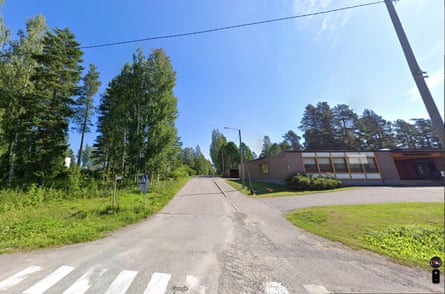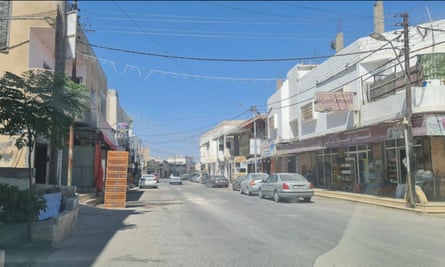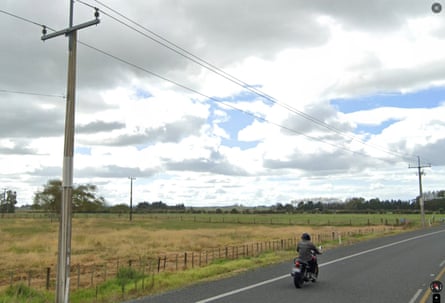
Picture a specific image from Google Street View. You’re going to try to guess exactly where in the world the photo was taken. The cloudless sky and desert landscape indicate somewhere hot. The grey road stretches far ahead of you with few defining characteristics. There are telegraph wires to the left of the road, above some short trees. You can zoom into the photo. You can pan around. You can’t, however, zoom out for added context. Can you guess? Oh, and you had one minute. Now you have about 30 seconds. In a 450-seat arena in Stockholm, one 31-year-old Dutch man doesn’t just correctly surmise that this photo was taken in Jordan; he guesses the location within 3 metres.
To the uninitiated, watching the GeoGuessr World Cup might not just sound unexciting, it might sound like a cruel and unusual form of punishment. Attending the tournament involves sitting in an arena and watching two nerds (“Everyone in this room is a nerd,” says one of the commentators confidently) sit in front of two computers and try to identify locations based on Google Street View photos. The closer you get to the exact location, the more points you get. That’s it. One nerd wins; both nerds are replaced by two different nerds. Well, call me a nerd because this simple spectacle turns out to be one of the most thrilling days of my life.
The game GeoGuessr could not be easier to understand. It was invented by Anton Wallén, a software developer who got the idea for the concept while on a road trip through the US. He was in New England when he thought that the forest landscape looked just like his native Sweden. When he arrived home he released an “ugly version” of the game and posted it on Reddit, where it immediately went viral. Now 10 years old, GeoGuessr has about 60 million subscribers.
If you have come across the game, it may be thanks to the online antics of Trevor Rainbolt, GeoGuessr’s most public champion. Rainbolt has made a name for himself in the last few years by posting clips of his unsettling ability to identify a Google Street View location despite seeing the photo for only a split second, or seeing only a blurred version of the photo. It is, for all intents and purposes, a superpower. The American is 25 but tells me he thinks he has spent more than 10,000 hours playing the game. That he didn’t think he was good enough to enter the World Cup tells you all you need to know about the other players.
Although it had an unofficial World Cup last year, this year the company means business. CEO Daniel Antell says that GeoGuessr spent more than £350,000 on the tournament. This includes £12,000 and a Venice holiday for the winner, and travel for all of the 24 players, who have come from countries as far away as Australia. For a relatively small company – GeoGuessr was only able to take on full-time employees in 2021 – this represents a huge investment.
In a bar during the preliminary round of 24, I pull up a stool and speak to some of the people watching on the big screens. It is an overwhelmingly male room. “I thought it would be boring to watch, but it’s not,” says Pawel, who is 22 and from Poland. He started playing every day during the pandemic. Key to its success, he thinks, is that there is no pressure to take it seriously. “It can be competitive, but it doesn’t have to be. You don’t have to be quick if you don’t want to. You don’t have to be that precise if you don’t want to.” A cheer erupts. Trabota, a player from Singapore, has guessed a location within 12 metres.
Pawel and two other fans from Poland, Matt and Simon, begin to explain some of the “metas” that seasoned players look out for. If you are in Australia you may be able to tell which state you are in because each uses slightly different telegraph poles. If you don’t know whether you are in Italy or San Marino, look at the image quality: San Marino’s is poorer. You can tell you are in Ghana if the Google car has a bar with black duct tape on it. (You can often see slivers of the car that has taken the photos.) Because there are more than 220bn Google Street View images, it would take a long time to go through all of these tips. They can be as specific as the type of trousers men wear in India.
GeoGuessr is made a touch easier because only 100 of the world’s 195 countries are represented on Google Street View. China doesn’t feature, and there is comparatively little coverage of Africa or the Middle East. In practice, this means that if you are presented with a photo and suspect you are in Africa, you can only be in Lesotho, Eswatini, Ghana, Senegal, Uganda, Botswana, Egypt, Rwanda, Nigeria, South Africa, the Canary Islands, Tunisia or Kenya. Easy.
Although there is a whole online ecosystem devoted to learning and sharing the various clues within these 100 countries, the masters often rely on instinct, or what the players call “vibes”. I appreciate this when a photo flashes up. I know within seconds that it was taken in the UK. But I can’t articulate what has made me sure; it is simply that I have lived in the country for 34 years and am intimately familiar with its features. The most devoted players have “lived” in various countries by studying their landscapes for multiple hours every day for several years. As Matt says, “I usually know … but I don’t know how.”
To be exceptional at GeoGuessr is to be a kind of topographical Sherlock Holmes. Blinky, a bearded, beanie-wearing, 24-year-old Frenchman, goes into the tournament as the favourite. Real name Mathieu Huet, he is widely considered to be invincible in moving games (games in which you can move wherever you like in order to identify your location). “It is annoying beforehand, having everyone say that you’re the favourite,” he says, “because you don’t want to get too confident, or you don’t want to have that pressure on you.” The lack of fighting talk among GeoGuessers is noticeable: these are people for whom the game has been not just a way of learning a skill but an important way of making friends. An Austrian fan called Daniel tells me that sometimes they don’t even play, they just talk.
Nevertheless, when the final eight meet for the quarter-finals in the Space Arena in Stockholm, there is an inevitable gladiatorial atmosphere. The circular black stage is dominated by the markings of a large white compass. A video plays on the big screen like a movie trailer: “Competitors come together, exploring unknown lands; remote places; forgotten back alleys. They seek hidden secrets, driven by a love of learning … Heroes are born. Together they master the art of finding anything, anywhere.”
Eight different nationalities are represented here and the first match is between the Hungarian “Debre” and the Canadian “Fungus” (real name Nathan Pfeffer). Players here are exceptionally young; Fungus is only 18. Some of the best players are about 14 years old but were prevented from competing in the World Cup by the 18+ age limit. The first image looks like a European farm. Here, the players are allowed to move around however they please. Debre guesses Belgium, forcing his opponent’s clock down to 15 seconds. Fungus guesses Belgium also. Debre is 96km away, Fungus 116. There are three rounds, each comprising 10 games if players don’t prematurely lose their allotted 6,000 points. As the games progress, the “damage” sustained rises, making a player’s losing guess increasingly catastrophic.
I realise four games in that we are looking at a photo of the UK. The players stroll around the area, both finding a billboard advertising Alexander Armstrong’s Classic FM show. Fungus sees a sign for Sandyhills parish church. The image turns out to be from Glasgow, and Fungus is only about 40km away, winning the game. When I ask Blinky and Rainbolt how to tell you are in the UK, Rainbolt says: “If it looks cloudy and depressing.” Both point out that if you know you are in Europe and can tell that the road is a left-hand drive road, you must be in the UK or Ireland. But there is a phenomenon called “death by Ireland”, says Rainbolt, that sees players incorrectly guess Ireland when they’re in the UK. You would also look out for yellow rear number plates and brick houses, but the latter may indicate Denmark or northern France. The UK also has an “obsession with hedgerows”, says Blinky, who considers England fiendish because there is little variation within the country.
At one point, in the round in which players can pan and zoom but not move, we are presented with a photo of a busy mountainside town with plenty of signage and a bridge in the centre of the image. Commentating, Rainbolt says it is Turkey. Both players go for east Turkey, but while Debre is 211km off, Fungus pinpoints it to within 8 metres. The skill is unfathomable. Not long afterwards, he goes through to the final four.

As Blinky emerges, whooping fans brandish a banner that says: “Blinky and you’ll miss it!” He calmly beats Gelotris, a Turkish player, after which he uses a fan’s back to autograph a map. In the semi-finals, Fungus takes on Consus, the Dutchman I mentioned at the top (real name Patrick Noordijk). They are locked at 2-2 when a rural image comes up. They can’t move, pan or zoom. Fungus guesses Mississippi. At the last minute Consus guesses Atlanta. Fungus is 136km away and Consus 315, but Consus clings on with only 320 points left. Next up is a nondescript road flanked by what look like pine trees. Both competitors realise it is Russia – incredible in itself – but there is a lot of Russia – about 17.1 million sq km. Both of them guess west Russia, but Consus is a staggering 25km away, bagging his place in the final, where he’ll meet the Frenchman with the beanie.
after newsletter promotion
Although AI is fast catching up with humans, the abilities of a great GeoGuesser are in demand. Not only has Rainbolt released promotional videos for brands such as the NFL and Domino’s, he also helps people identify the locations in treasured old photos and has even helped arrest people (though he doesn’t want to expand on that). He reads all his requests – “the good, the ugly, and the worse” – and won’t help people stalk other people. “It’s a pretty big responsibility to make sure you’re doing the right thing and having the right moral compass,” he says.
“Years from now, you will be able to say you were at the first GeoGuessr World Cup grand finals!” says the on stage hype-man as the final arrives. “Raise … the … roof!” Blinky is the favourite here – though his semi-final was extremely tight – but Consus has been breathtaking. The first image is of New Zealand, a country Consus struggles with, and Blinky moves ahead. After this it is neck and neck, with Blinky predictably taking the first moving round but Consus pulling it back to 1-1 – and with a New Zealand image no less. “Blinky is upset,” says Rainbolt.

To everyone’s surprise, Consus then wins the next moving round (Blinky’s first defeat in 10 moving rounds), at one point coming within 7 metres in Vermont. In round four, in which they can pan and zoom, the two are neck and neck for nine games. The 10th game is crucial. They see an image of a crossing flanked by trees. There are blue skies above, green fields to the left, and a white house with a red roof to the right. The music pumps and pumps and pumps. With almost no time left, Consus zooms in to west Finland; Blinky goes south. Who’s closer? All of a sudden, being only 75km away, it’s Consus. The Dutchman wins the GeoGuessr World Cup. The arena erupts into a standing ovation for the bashful 31-year-old. “I never knew GeoGuessr could be this intense, holy shit,” says one of the live followers. Consus drops the lid of the trophy as he holds it aloft.
Can GeoGuessr compete with the esport big boys? By and large, the most popular esports are combat-centric. And League of Legends, arguably the world’s biggest esport, offered $2.25m to its winners in 2023. But GeoGuessr’s appeal lies in its accessibility. “The barrier of entry for this is probably lower than any esport ever,” says Rainbolt. Daniel Antell likens it not to any esport but to darts. “I think we are aiming to go a little broader than the regular esport community audience,” he says.
GeoGuessr’s chances of sitting at the big table depend on whom you ask. Blinky says: “I don’t want to doubt them, but I’m a bit sceptical as to how successful it can be.” One development that would help is a proliferation of Rainbolts: charming and articulate online presenters able to pick up millions of followers (2.7 million people currently follow Rainbolt on TikTok). This could be the game’s achilles heel: though games such as League of Legends and Counter-Strike have numerous players earning millions playing and streaming, there are perhaps three people currently making a living from playing GeoGuessr. Although Consus is elated to have won, he doesn’t think he could hack it as a content creator. And Blinky? “I don’t have a yearning for stardom,” says the Frenchman, modestly.
Nevertheless, if you build it, they will come. The World Cup provided a 20% rise in subscribers and will be bigger next year. One realisation was how nail-biting the game is as a spectator sport. Fans can’t wait another year to watch the greats compete. In 10 years, perhaps identifying locations on Google Street View will be a legitimate career aspiration. “I think it can be big,” says Antell. Having utterly seduced me, it’s certainly right up my street.
Answers
1 Finland: specifically Mikkeli in the country’s south-east.
2 Jordan: Ar-Ramtha: east of Irbid on the Syrian border.
3 New Zealand: Burbush, west of Hamilton on the North Island.



